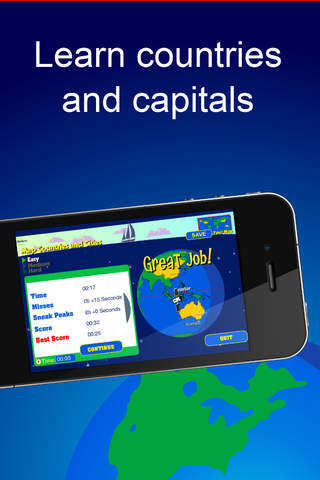
GeoGames: Build Planet Earth, Map Countries and Cities
Learn the world continents, rivers, mountains, countries, and capitals.
A fun research-backed app for kids to learn world geography: GeoGames is the result of a five-year research study led by Reach the World, Dr. Susan Lowes at Teachers College, Columbia University, and funded by the National Geographic Society Education Foundation.
A Research Based App
In 2003, RTW and Dr. Lowes set out to research the question, “How do young children gain their cognitive understanding of world geography?” This study yielded a new model for geography learning. It also led to the development of GeoGames, a set of online, interactive geography-learning games for young learners. RTWs GeoGames are a proven tool for teaching geography, backed by academic research.
Play-to-Learn: An Equitable Method for Teaching Geography
Traditional methods of geography learning are largely based upon memorization and may be discriminatory toward children who have low reading levels. GeoGames brings geography learning into the 21st Century via a play-to-learn approach. Children can play and learn complex geographic concepts; reading skills are not required.
Key Concepts: Nesting, Scale and Spatial Relationships
The GeoGames research study identified six key concepts that young learners need in order to become proficient in world geography: the concept of the map frame, the shape and placement of objects in the map, the orientation of these objects, the spatial relationships among them, the nesting of objects within objects, and the scale of the different objects. In RTW’s GeoGames, the scaffolding, or order of activities, is designed to help students with all six concepts listed above.
App Sales Support Scholarships
All sales of Reach the World’s GeoGames directly support RTW’s scholarship fund for disadvantaged youth. In the future, RTW plans develop new games featuring human and physical geography themes. These new games will teach subjects such as world languages, population density, world health, climate change, ecosystems and natural resources.



